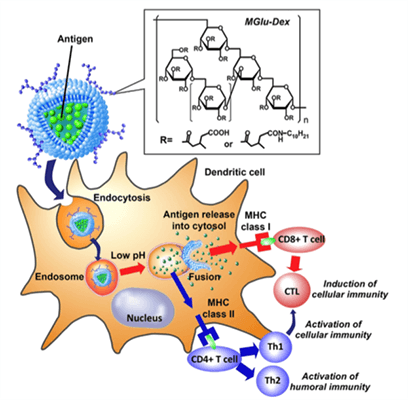Mempro™ pH-Sensitive Liposomes
Creative Biostructure has developed an advanced and innovative Mempro™ Liposome platform to offer various liposomal products and services to our clients. Creative Biostructure provides a wide variety of customized formulations of pH-sensitive liposomes in which lots of desired agents such as drugs, oligonucleoides, and peptides/proteins were encapsulated.
 Figure 1. Induction of antigen-specific immunity by MGlu-Dex-modified liposomes. MGlu-Dex-modified liposome is trapped in endosome and taken up by dendritic cell via endocytosis. The surrounding environment is weakly acidic which triggers destabilization of the liposome, inducing release of antigen molecules in endosome. (E. Yuba, et al., 2016)
Figure 1. Induction of antigen-specific immunity by MGlu-Dex-modified liposomes. MGlu-Dex-modified liposome is trapped in endosome and taken up by dendritic cell via endocytosis. The surrounding environment is weakly acidic which triggers destabilization of the liposome, inducing release of antigen molecules in endosome. (E. Yuba, et al., 2016)
Liposomes modified with membrane-active molecules are usually considered as promising candidates to introduce antigenic proteins into cytosol of dendritic cells because they are able to destabilize or fuse with cell membranes. Creative Biostructure has developed Mempro™ pH-Sensitive Liposomes for controlled delivery of various encapsulated agents, and pH-sensitive liposomes are very useful to transport hydrophilic compounds such as oligonucleotides and membrane proteins, making them such a powerful tool in cancer therapy and gene therapy.
Originally, pH-sensitive liposomes are made of non-bilayer forming lipids like DOPE which can be stabilized in a bilayer conformation by utlizing a specific lipid, and this specific lipid alters its charge depended on the pH condition. To design pH-sensitive liposomes, CHEMS (cholestryl hemisuccinate) lipid is one of the most applied pH-dependent lipids. This unique lipid is unprotonated when the pH is at neutral, while protonated when the pH shows acidic. If unprotonated, CHEMS is able to stablize DOPE as a lipid bilayer, whereas, the bilayer conformation will be disrupted at acidic pH. The principle behind pH-sensitive liposomes design is that CHEMS becomes protonated based on the acidic endosomal environment once the vesicle is endocytosed.
In the past few years, Creative Biostructure has developed a lot of formulations of pH-sensitive liposomes. These pH-sensitive liposomes are composed of lipids which have a lamellar phase at physiological pH (around 7.4). The fusion of pH-sensitive liposomes with the cell membrane will occur if the pH reach to a certain value (around 5.5). As a result of this fusion process, the ecapsulated agents, especially the drugs, will be released into the cytosol. The lipids change from lamellar phase to hexagonal HII phase at the lower pH, which leads to the fusion. At the same time, the cell membrane defect take place, resulting in the release of the encapsulated agents into the surrounding parts.
Creative Biostructure is able to apply various methods to prepare pH sensitive liposomes with high encapsulation value, such as reverse-phase evaporation (REV), freeze-drying and freeze-thawing. Furthermore, Mempro™ Fluorescence Resonance Energy Transfer (FRET) Assay can be used to monitor the fusion process of liposomes with cell membranes.
Besides Mempro™ pH-Sensitive Liposomes, other functional liposomes are also available. Creative Biostructure is more than happy to assist you to design and produce novel functional liposomes. Please feel free to contact us for a detailed quote.
References:
S. R. Paliwal, et al. (2016). Hyaluronic acid modified pH-sensitive liposomes for targeted intracellular delivery of doxorubicin. Journal of Liposome Research, 26(4): 276–287.
E. Yuba, et al. (2014). Dextran derivative-based pH-sensitive liposomes for cancer immunotherapy. Biomaterials, 35: 3091-3101.
Y. Yoshizaki, et al. (2014). Potentiation of pH-sensitive polymer-modified liposomes with cationic lipid inclusion as antigen delivery carriers for cancer immunotherapy. Biomaterials, 35: 8186-8196.